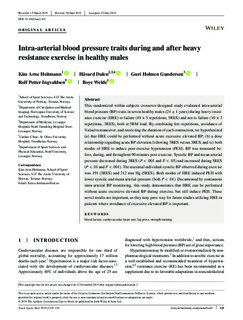Intra‐arterial blood pressure traits during and after heavy resistance exercise in healthy males
Journal article, Peer reviewed
Published version
Permanent lenke
http://hdl.handle.net/11250/2645312Utgivelsesdato
2019Metadata
Vis full innførselSamlinger
Originalversjon
Heitmann, K. A., Dalen, H., Gundersen, G. H., Ingvaldsen, R. P. & Welde, B. (2019). Intra‐arterial blood pressure traits during and after heavy resistance exercise in healthy males. Translational Sports Medicine (TSM), 2(6), 325-333. doi: 10.1002/tsm2.102Sammendrag
This randomized within‐subjects crossover‐designed study evaluated intra‐arterial blood pressure (BP) traits in seven healthy males (24 ± 1 years) during heavy resistance exercise (HRE) to failure (10 × 5 repetitions, 5RES) and not to failure (10 × 3 repetitions, 3RES), both at 5RM load. By combining few repetitions, avoidance of Valsalva maneuver, and restricting the duration of each contraction, we hypothesized (a) that HRE could be performed without acute excessive elevated BP; (b) a dose relationship regarding acute BP elevation following 5RES versus 3RES; and (c) both modes of HRE to induce post‐exercise hypotension (PEH). BP was measured before, during, and throughout 90 minutes post‐exercise. Systolic BP and mean arterial pressure decreased during 3RES (P < .001 and P < .05) and increased during 5RES (P < .01 and P < .001). The maximal individual systolic BP observed during exercise was 191 (3RES) and 212 mm Hg (5RES). Both modes of HRE induced PEH with lower systolic and mean arterial pressure (both P < .01). Documented by continuous intra‐arterial BP monitoring, this study demonstrates that HRE can be performed without acute excessive elevated BP during exercise, but still induce PEH. These novel results are important, as they may pave way for future studies utilizing HRE in patients where avoidance of excessive elevated BP is important. Intra‐arterial blood pressure traits during and after heavy resistance exercise in healthy males

